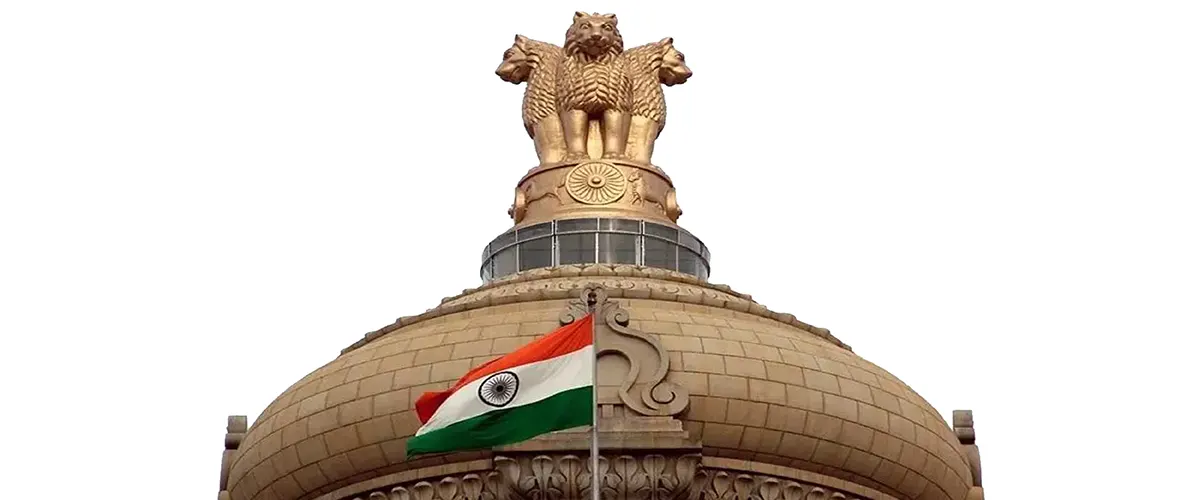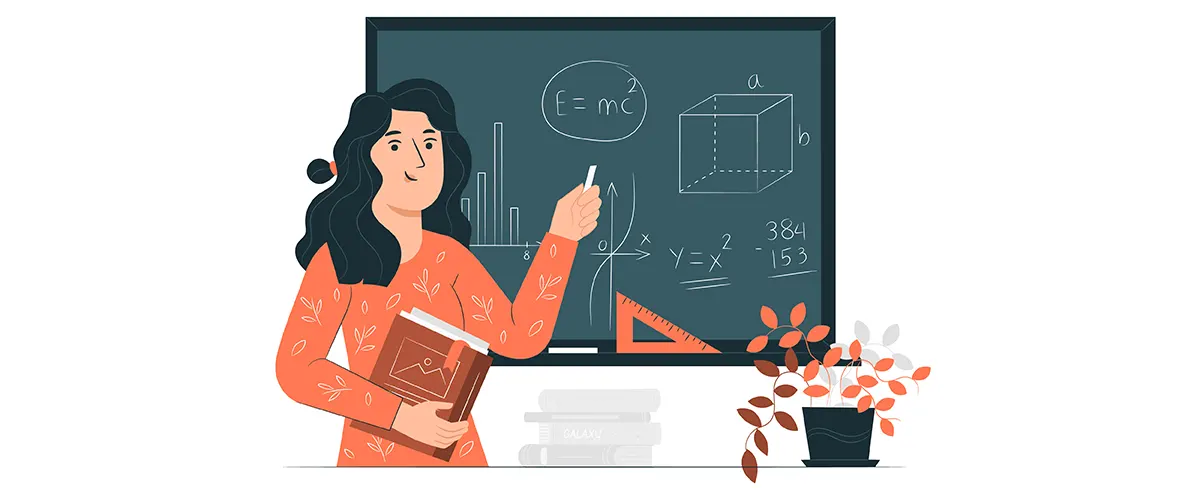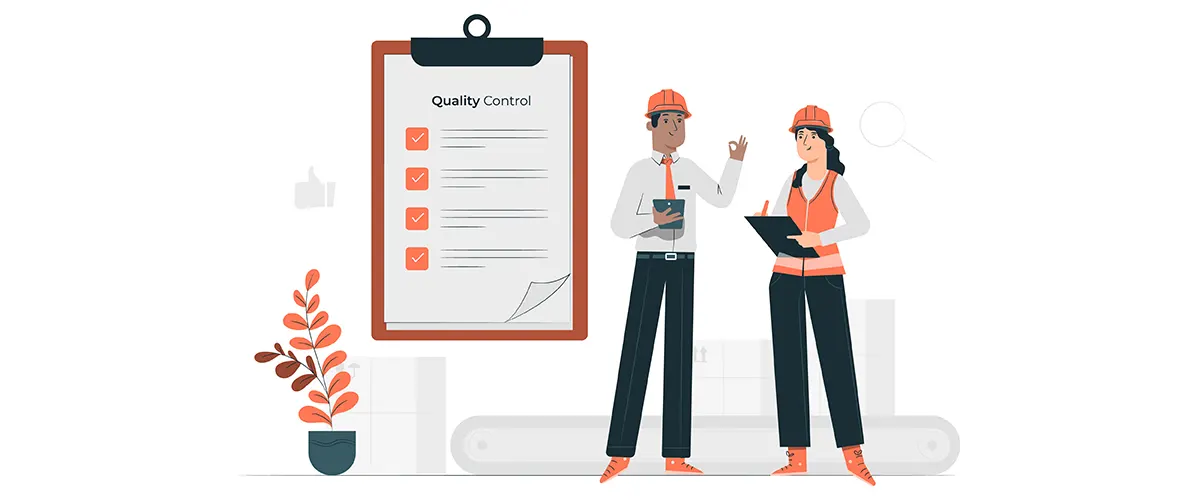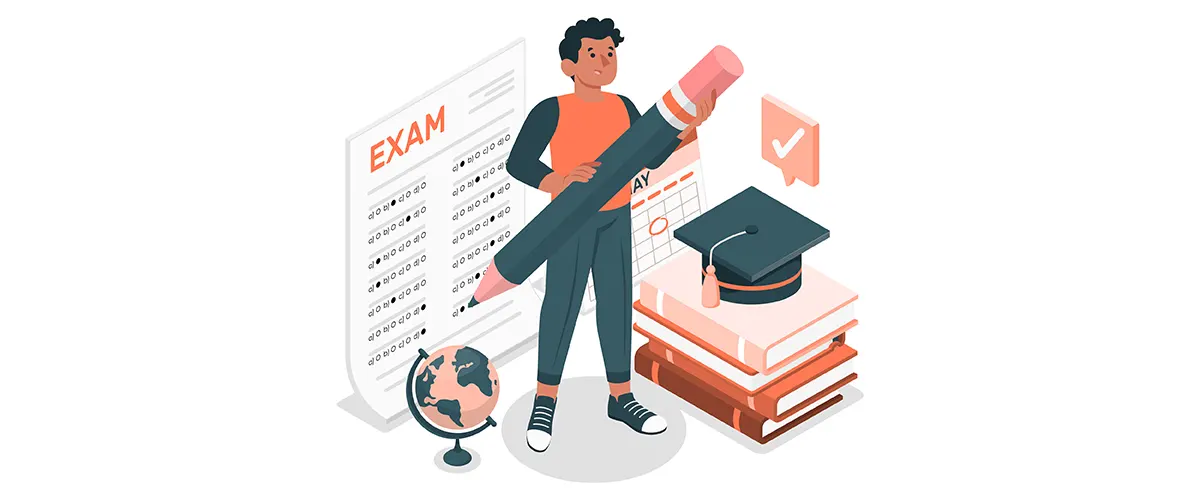The number of entrance exams held in India every year is quite a few with thousands of aspirants taking them. Cracking those exams isn’t a cakewalk but needs the candidate to take strong preparation.
Which is the toughest exam in India? What are some of the most coveted exams in India that are quite difficult? That’s what this article focuses on.
- ▪ List of Toughest Exams in India
- ▪ 1. Civil Services Examination (UPSC)
- ▪ 2. National Eligibility Test (UGC-NET)
- ▪ 3. NEET
- ▪ 4. CLAT
- ▪ 5. IIT JEE Entrance
- ▪ 6. NDA
- ▪ 7. Chartered Accountant Exam
- ▪ 8. Graduate Aptitude Test in Engineering (GATE)
- ▪ 9. Common Admission Test (CAT)
- ▪ 10. SSC CGL
- ▪ Wrapping Up
- ▪ Frequently Asked Questions
Here, in this discussion, we will take a look at some of the most difficult entrances held in the country with a brief description of each of them. Seems interesting? Keep reading!

List of Toughest Exams in India
Among the top exams in India, the following are usually looked upon as the most difficult and need the aspirant to be super strict with their preparation strategy to come out with flying colours. They are:
- Civil Services Examination (UPSC)
- UGC-NET
- NEET
- CLAT
- IIT JEE Entrance
- NDA
- Chartered Accountant Exam
- SSC CGL
- GATE
- CAT
Now, let’s have a quick look at the exam details of the mentioned entrances.
1. Civil Services Examination (UPSC)

The Union Public Service Commission Civil Services Examination is considered the toughest exam in India with close to 10 lakhs applicants opting for it, every year. The applicant numbers every year for the IAS exam go around 8 lakhs on average with the years 2017 and 2018 seeing a whopping stat of close to 10 lakh applications.
Candidates sitting for the examination need to cover a vast syllabus for the prelims and mains. It includes diverse topics, including:
- Global events of national and international significance
- Indian History and different movements
- Indian & World Geography
- Indian Polity and Government
- Social Sciences
- Interpersonal Skills
- Basic Numerical ability
- Logical Reasoning
- Comprehension
- Essay Writing, etc.
A maximum of 0.1% to 0.2% of students make it every year among the lakhs of candidates going for it. The UPSC exam has a 3-stage selection process including the two prelims papers, mains, and the final interview round.
Prelims: The UPSC Prelims have two papers; General Studies and Civil Services Aptitude Test. It is the primary screening test, clearing which makes the candidate eligible to sit for UPSC mains.
The derived marks in Prelims don’t count in the final rank list.
Mains: The second stage of selection includes the mains exam which has 9 papers; out of which 2 are qualifying. Here, the candidates are tested on their academic knowledge and in-depth understanding of different topics.
Personality Test/Interview: The selection process concludes with the final interview round, cracking which makes the candidate eligible for one of the most prestigious national positions.
All these are contributing factors in making UPSC the most difficult exam in India.
UPSC: A Quick Overview
| Particulars | Details |
| Conducting Body | UPSC, Government of India |
| Frequency | Once a Year |
| Exam Mode | Offline |
| Exam Medium | English & Hindi |
| Exam Duration | Prelims: 2 Hours, Mains: 3 Hours |
| Official Website | www.upsc.gov.in |
2. National Eligibility Test (UGC-NET)

The University Grants Commission conducts the national eligibility test to select eligible candidates as Junior Research Fellows and Assistant Professors across various Indian colleges, universities, and institutions. As a UGC-NET-qualified candidate, you are eligible to take up teaching positions in different Indian schools and colleges, based on the requirements and your interest.
With thousands of candidates taking up the NET exam every year, only 6% of them could make it to the top merit list. The candidates need to do staunch hard work and leave no pages of the syllabus unturned if they truly aspire to crack this exam that has two papers; paper 1 for teaching aptitude, and paper 2 on domain knowledge.
It is the toughest exam in India to crack in the academic sector.
The Paper 1 of Teaching and Research Aptitude, covers the following topics in the syllabus:
Teaching Aptitude:
- Nature, objectives, characteristics and basic teaching requirements
- Learner’s Characteristics
- Factors Affecting Teaching
- Teaching Aids
- Methods of Teaching
- Evaluation System
Research Aptitude:
- Research: Meaning, types and characteristics
- Methods and Steps of Research
- Research Ethics
- Format and Characteristics of Thesis Writing
Communication:
- Types, nature, characteristics, barriers and effective classroom communication.
Reasoning Including Mathematical Ones:
- Number series, letter series and codes
- Relationship and classification
Data Interpretation:
- Sources, acquisition and data interpretation
- Quantitative and Qualitative Data
- Data representation and mapping
Information and Communication Technology ( ICT)
- ICT
- General abbreviations
- Internet and emailing basics
People and Environment
- Pollution sources
- People and environment interaction
- Natural hazards and mitigation
- Effects of pollutants
- Exploitation of natural and energy sources
Higher Education System: Governance, Polity and Administration
- Structure of the institution for higher learning and research in India
- Formal and distance education
- Value education
- Policy and interaction
- Concepts
- Institution and their interactions
Paper 2 has subject-based, in-depth questions.
Candidates who successfully clear both the papers, pass this highly coveted exam.
UGC NET: Quick Overview
| Particulars | Details |
| Conducting Body | National Testing Agency (NTA) |
| Exam Mode | Online (CBT) |
| Languages | English, Hindi |
| Exam Duration | Paper I: 90 mins, Paper II: 90 mins |
| Official Website | UGC Net |
3. NEET

Another entrance making it on the list of the toughest exam in India is the NEET; National Eligibility cum Entrance Test. Candidates seeking admission in MBBS and BDS courses across the government and private colleges in India, need to clear NEET. The higher their rank, the higher tier institute is allocated to them.
Cracking NEET, needs the students to cover an enormous syllabus and they must get ahead with their preparation right from class 12. The answerer needs to attempt 180 questions across three different sections of Physics, Chemistry, and Biology/Computer Science.
The various courses offered through clearing NEET include:
- MBBS: Bachelor of Medicine and Bachelor of Surgery (Allopathy)
- BDS: Bachelor in Dental Surgery
- BHMS: Bachelor of Homoeopathic Medicine and Surgery
- BAMS: Bachelor of Ayurvedic Medicine and Surgery
- B.Pth: Bachelor of Physiotherapy
- Specialisation in Yoga and Naturopathy
- Specialisation in Siddha Medicine
The year 2021 saw a massive number of close to 15 lakhs aspirants seating for the exam. Only a few percent of them can make it to top-tier institutes. All these contributing factors make NEET one of the toughest examinations in India.
NEET: A Quick Overview
| Particulars | Details |
| Conducting Body | National Testing Agency (NTA) |
| Frequency | Once a Year |
| Exam Duration | 3 Hours |
| Languages | English, Hindi, Bengali, Telugu, Assamese, Kannada, Odia, Marathi, Urdu, Tamil |
| Website | NEET |
4. CLAT

The next name on India’s toughest exam list is CLAT or the Common Law Admission Test. The entrance takes place to admit candidates across 23 National Law Universities in India, based on their CLAT scores.
With over 60 thousand candidates appearing for the National Level law exam every year, only 3-4% of them could make it to the top list. Candidates clearing the exam can seek admission in the 5-year integrated law program i.e., B.A.LLB/B.Sc.LLB or equivalent.
The list of universities accepting CLAT Scores are:
- National Law School of India University, Bangalore
- National Academy of Legal Study and Research University of Law, Hyderabad
- National Law Institute University, Bhopal
- The West Bengal National University of Juridical Sciences, Kolkata
- National Law University, Jodhpur
- Hidayatullah National Law University, Raipur
- Gujarat National Law University, Gandhinagar
- Dr. Ram Manohar Lohiya National Law University, Lucknow
- Rajiv Gandhi National University of Law, Patiala
- Chanakya National Law University, Patna
- National University of Advanced Legal Studies, Kochi
- National Law University, Cuttack, Odisha
- National University of Study and Research in Law, Ranchi
- National Law University and Judicial Academy, Guwahati, Assam
- Damodaram Sanjivayya National Law University, Vishakappatnam
- Tamil Nadu National Law School, Tiruchirapalli, Tmail Nadu
- Maharashtra National Law University, Mumbai
- Maharashtra National Law University, Nagpur
- Maharashtra National Law University, Aurangabad
- Himachal Pradesh National Law University
- Dharmashastra National Law University, Jabalpur
- D.R. B.R. Ambedkar National Law University, Sonipat
The vast syllabus of CLAT includes the following sections:
- English including Comprehension
- Current Affairs and General Knowledge
- Legal Reasoning
- Logical Reasoning
- Quantitative Techniques
The ratio of limited seats and high number of applications with an enormous syllabus to cover, makes CLAT one of the top toughest exams in India.
CLAT: A Quick Overview
| Particulars | Details |
| Conducting Body | National Law University, Cuttack, Odisha |
| Exam Mode | Offline |
| Language | English |
| Exam Duration | 2 Hours |
| Official Website | Consortium of NLUs |
5. IIT JEE Entrance

Considered to be the toughest exam in India to get into top-tier engineering institutes, every year more than 6 lakhs aspirants sit for the IIT Joint Entrance Examination. The syllabus for the IIT JEE is endless and only a few candidates make it to the top list.
The exam is held on two levels. The first part is JEE Mains clearing which makes the candidate eligible for taking the JEE Advanced. On average, out of 6 lakhs students every year, only 2-3 lakhs make it to the JEE Advanced, where only a few can make it to the top Indian engineering institutions.
Through this premium engineering entrance exam, candidates can seek admission across various courses like B.E./B. Tech, B.Arch across the top NITs, IITs, and State Engineering colleges in India.
IIT JEE Entrance: A Quick Overview
| Particulars | Details |
| Conducting Body | National Testing Agency |
| Mode of Application | Online |
| Frequency | 2 Times a Year |
| Medium of Question Paper | Bengali, English, Assamese, Gujarati, Marathi, Hindi, Kannada, Odia, Malayalam, Telugu, Tamil, Urdu, Punjabi |
| Official Website | JEE Main |
6. NDA

India’s hardest exam to get into the prestigious army is the National Defence Academy and Naval Academy Exam. Through this exam, candidates are screened to be a part of the army, air force, or navy. The NDA exam selection process goes like this:
- Written Exam
- Psychological Aptitude Test
- Intelligence Test
- Personality Test
- Interview
The entire selection process is extensive and needs the candidates to give their best to make it to the merit list. The selected candidates need to pass a physical fitness test too, before being considered for the final position.
Paper I syllabus consists of:
- Algebra
- Trigonometry
- Matrices and Determinants
- Differential Calculus
- Analytical Geometry of two and three dimensions
- Integral Calculus and Differential Equation
- Statistics and Probability
- Vector Algebra
Paper II syllabus consists of:
- Part A English: Vocabulary, Grammar, Comprehension
- General Knowledge: Current Affairs, Events, Environment and Geography, Physics, Chemistry, etc.
The exhaustive selection process and high applications compared to limited and quality seats, make NDA amust mention as the toughest exam in India.
NDA: A Quick Overview
| Particulars | Details |
| Conducting Body | UPSC |
| Mode of Exam | Offline |
| Frequency | Twice a Year |
| Required Marital Status | Unmarried |
| Official Website | https://www.upsc.gov.in/ |
7. Chartered Accountant Exam

The Chartered Accountant Exam is indeed among India’s toughest exams. CA aspirants need to crack several stages to make it as Chartered Accountants. Students need to cover an extensive syllabus and pass through the phases of the CPT, IPCC, and CA Final Examination.
It requires the aspirant to get ahead with a strong preparation strategy and strong planning.
The CA Syllabus is vast and here’s a small glimpse of the same:
- Principles and Practice of Accounting (theoretical framework, accounting process, basic accounting ratios, etc.)
- Business Law (the Indian Contract Act, 1872, The Sale of Good Act, 1930, The Indian Partnership Act, 1932, the Limited Liability Partnership Act, 2008, The Companies Act, 2013)
- Business Correspondence & Reporting (Comprehension passages, note making, article writing, report writing, writing formal emails, resume writing meetings, etc.)
- Business Mathematics (equation and matrices, time value of money, permutations and combinations, sequence and series, etc.)
- Logical Reasoning
- Statistics
- Business Economics (business cycle, price determination, etc.)
- Business and Commercial Knowledge (business environment, organisations facilitating business, common business terminologies, etc.)
The scintillating wave of applications, a strenuous selection process and a vast syllabus; all these make CA one of the toughest examinations in India.
CA Foundation Exam: A Quick Overview
| Particulars | Details |
| Conducting Body | Institute of Chartered Accountancy |
| Exam Mode | Offline |
| Frequency | Multiple times in a year |
| Official Website | ICAI |
8. Graduate Aptitude Test in Engineering (GATE)

The toughest exam in India to seek admission in master’s and doctoral level courses in engineering, architecture technology, and science is the Graduate Aptitude Test in Engineering, better known as GATE. Candidates clearing this entrance can make their way to different government colleges including IITs and NITs.
After the GATE scores are announced, it’s valid for up to 3 years. Some selected Public Sector Undertakings accept these scores too, to take candidates in the various courses offered by the institution.
One of the most highly coveted exams in India, the ratio of applicants and passed students has a massive difference. For instance, in 2021, close to 7 lakh aspirants applied for the exam while some 1.26 lakh candidates could only crack it.
Here’s a glimpse of the vast GATE syllabus that students need to cover:
- Engineering mathematics
- Digital Logic
- Computer Organisation and Architecture
- Databases
- Computer Organisation and Architecture
- Algorithms
- Theory of Computation
- Operating Systems
- Compiler Systems
- Computer Networks
- General Aptitude
All these are contributing factors in making GATE the toughest entrance exam in India.
GATE: A Quick Overview
| Particulars | Details |
| Conducting Body | IIT Kanpur |
| Exam Mode | Online (CBT) |
| Language | English |
| Duration | 3 Hours |
| Official Website | GATE 2022 |
9. Common Admission Test (CAT)

Common Admission Test is a top entry-level exam for aspirants seeking admission across various top-tier management and business schools in India including the IIMs for the MBA program. Candidates are tested on different parameters like English, mathematical ability, and reasoning and screened exclusively to make the best list.
Why is CAT considered to be the toughest exam in India as a ladder to get into top-tier business schools? Because only 2% of the total applications can make it to the final merit list.
If we are to calculate them in numbers, out of 2 lakh applicants, only around 1500 candidates succeed in clearing the CAT. Getting into the premium B schools is quite difficult too, because that involves further rounds of assessments, as well.
Here’s a quick glimpse at the CAT syllabus:
Quantitative Aptitude
- Arithmetic: HCF, LCM, Ratio and Proportion, Percentage, Average, Number System, Age Calculation, Distance, Time & Work
- Algebra: Quadratic Equation, Permutation and Combination, Number Series, Sequence, Hypothesis of Equations
- Percentage: Application of percentages
- Trigonometry: Height and distance, trigonometric ratios
- Mensuration: Pipes and Cisterns, Circles, Squares, Cones, Cubes, Rectangles, Area and Volume
- Calculus
- Geometry & its Applications
Verbal Ability
- Comprehension
- Vocabulary
- Grammar
- Analogies
- Idioms
- Paragraph Completion
Logical Reasoning
- Puzzles
- Series
- Direction Sense
- Clock and Calenders
- Coding Decoding
- Blood Relations
- Arrangements
- Charts, Tables, Graphs
The extensive selection process and an enormous syllabus makes CAT the most difficult exam in India to crack and get into top-notch business schools.
10. SSC CGL

The next inclusion in the list is the Staff Selection Commission CGL exam. The most common exam among the country’s graduates, SSC CGL takes place to recruit candidates for different roles across different government organizations, ministries, subordinate offices, and departments.
It is the toughest exam in India to land a position in the Central Government department. The SSC CGL comes with an extensive selection process that includes:
- Tier I test is based on objective multiple choice questions.
- Tier II comprises objective-based MCQs. Both these tiers are held online in CBT mode.
- Tier III is the descriptive paper that tests candidates on their writing ability. It takes place in pen and paper mode.
- Tier IV is the final round of skills tests where the candidates are judged on their computer proficiency.
Here’s a short glimpse of the topics covered in Tier I and II exams:
Tier I
- Quantitative Aptitude ( Profit and Loss, Partnership, Interest, Average, decimals, fractions, graphs, etc)
- English Language (Phrases and Idioms, sentence improvement, synonyms and antonyms, voice, narration, one word substitution, etc)
- General Awareness (Current Affairs, Important Schemes, Science, Books and Authors, People and News, etc)
Tier II
- Quantitative Ability (Ratio and Proportion, Square Roots, Discounts, Profit and Loss, Mixture, Time and Work, etc.)
- English Language and Comprehension (Cloze test, comprehension passages, Sentence Improvements, spotting the errors, etc.)
- Statistics: Collection, Classification and Presentation of Statistical Data, Measures of Central Tendency, Correlation and Regressions, Measures of dispersion, Moments, Skewness and Kurtosis, Probability Theory, Sampling Theory, Statistical Inference, Time Series Analysis, Index Numbers, etc.
- General Studies: Finance and Economics- Financial Accounting, basic concepts of accounting, accounting principles, single and double entry, bank reconciliation, trading, balance sheets,non-profit organisation accounts, etc.)
- Economics and Governance- Basics of Economics, Theory of Demand and Supply, Micro Economics, Theory of Production and Cost, Price Determination Markets, Indian Economy, etc.
The ocean-like syllabus of SSC CGL and tough screening procedure, makes it one of the toughest competitive exams in India.
SSC CGL: A Quick Overview
| Particulars | Details |
| Conducting Body | Staff Selection Commission |
| Application Process | Online |
| Exam Frequency | Once a Year |
| Mode of Exam | Online and Offline |
| Official Website | https://ssc.nic.in/ |
Oswal competitive entrance books serve as the one-stop buying destination if you’re looking to pick any guide book for an entrance. Check out the link to pick the book of your need.
Wrapping Up

These are a few mentions in the list of the toughest exam in India. Other difficult competitive examinations that need the students to be super dedicated to their preparation include Xavier Aptitude Test (XAT), Combined Defence Exam (CDS), Air Force Commission Test (AFCAT), RBI Assistant Recruitment Examination, IBPS RRB, etc.
Taking the national-level entrance exams and making it to the top list amidst hard-core completion, needs next-level hard work and a strong preparation strategy. The willpower guided by the right action plan can surely help them reach their dream place.
Frequently Asked Questions

Q1: What is the toughest exam in India?
Ans: UPSC Civil Services Exam is considered to be the hardest exam in India as the candidates must cover a huge syllabus and go through a difficult screening process. The selection has three stages including the two papers of Prelims, Mains, and the final interview round.
Q2: Is UGC NET the toughest exam in India?
Ans: The UGC-NET is considered to be India’s most difficult exam in the academic sector. Cracking this exam makes the candidates eligible for the positions of Assistant Professor and Junior Research Fellows across various Indian colleges and institutions.
Q3: How many selection stages are there for the NDA exam?
Ans: One of the top toughest exams in India is the NDA which comes with a five-stage selection process including a written exam, psychological aptitude test, intelligence tests, personality test, and personal interview round.
Q4: Is SSC CGL the toughest exam in India?
Ans: SSC CGL is regarded as one of the toughest exams in India due to the vast syllabus the applicants need to cover and the long selection process. Cracking the entrance makes them eligible for various posts across the prestigious sectors of the central government.
Q5: Which exam do the candidates need to clear to get into the top business schools of India?
Ans: Candidates need to crack the highly competitive CAT exam to seek admission to the top business schools of India. After clearing the CAT, candidates need to go through the screening assessments of the business schools.
Q6: Through which exam candidates can seek admission in the Master’s level engineering programs?
Ans: Candidates need to crack the GATE exam, to apply for masters level engineering programs in top-tier government colleges.
Q7: Who conducts the CLAT exam and why is it conducted?
Ans: The National Law University of Cuttack, conducts the Common Law Admission Test (CLAT) to select eligible candidates for the five-year integrated law programs across the 23 participating universities, all over India.
Q8: Who conducts the Chartered Accountant Exam and how many times the year it is conducted?
Ans: The Institute of Chartered Accountancy conducts the CA Foundation Exam to select eligible candidates as Chartered Accountants. The exam takes place multiple times a year.
Q9: Through which exam candidates can seek admission in the bachelor of medicine courses?
Ans: Candidates need to crack the NEET exam, regarded as one of the most difficult exams in India, to seek admission in the bachelor of medicine course across the top-tier institutions.
Q10: Is IIT JEE the toughest exam in India?
Ans: The IIT JEE is conducted to select candidates in various engineering courses across the government colleges of India. The enormous syllabus, long selection process, and huge application numbers make it one of the toughest exams in India.


I am not sure where you’re getting your info, but good topic.